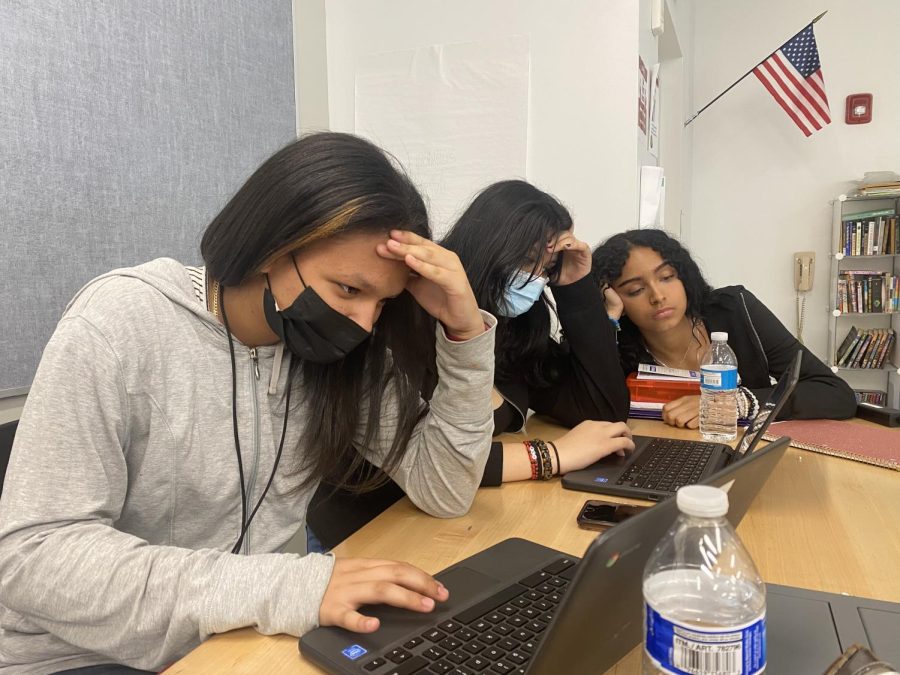State testing: an unworthy sacrifice
STRESSFUL TEST PREP: Students are not amused after their language arts teacher assigns NJSLA prep work.
May 25, 2022
As someone who’s experienced standardized testing in two states, I’ve witnessed the bias, anxiety, and inaccuracies that comes along with any type of standardized testing. The value given to standardized tests for kids in New York City is crushing to their self esteems and mental health.
I remember as a child when I lived there, how much anxiety my friends and I felt before the State test that took place every year. (Grades 3-8) There was the pressure all around us that we had to get the highest score possible. Our math and language arts classes would spend months where the only work we completed was practice test booklets.
The pressure to do well created competition between friends. There was always a silent grudge that existed between everyone where we always wanted to do better than the other. I’m guilty of this myself, but we were taught by those around us that kids that don’t score so well on these tests were “dumber” or “less than”, which isn’t true in the slightest. But, we were all too young to understand the discriminatory system behind it.
Mr. Malmstrom, WMS’S language arts and journalism teacher said, “For people that are just very good in school and are very clearly smart and then don’t do well in tests creates a mental block that makes them think they’re not smart and that to me is very dangerous”
I remember the fear that everyone in the school experienced as spring testing was approaching. I also remember science and history class time being taken away just for the purpose of being bombarded with more practice work. There was nothing I despised more than having to sit in class for 80 minutes and read uninteresting articles and answer multiple choice questions that I barely understood.
You can argue that it “over prepared me”, but I still don’t know what I’m doing. All I remember is being taught HOW to take the test. I was taught how to identify keywords of a multiple choice question, not how to truly understand the passage that was given to me. It was never about learning, it was always about raising the schools testing statistics. I haven’t learned a single thing through these tests.
Standardized testing didn’t always hold this much weight in education. Mr. Van, who has been teaching for a few decades said that he recalled the tests weren’t stressed as much, and there “wasn’t too much preparation.”
Now, students are stressed about their scores before even taking the test. 8th grader Kobe Henry said, “It’s just nerve wracking to think about what you’re going to get.”
Classism and Racism in Standardized Testing
Standardized testing around the country costs money, whether it’s for preparation or the test itself. Standardized testing feeds off of wealth, not the ability of students taking it. They get over a billion dollars collecting test money, and people lose money paying for test prep. The SAT is a college admissions exam taken by all highschoolers in America. Test prep for the SAT can range up to 2,000 dollars.
Low income families do not have the privilege of throwing away so much money for a test that simply reflects ability to memorize, not talent. In New Jersey, the SAT costs 55 dollars. To some, that may not seem like a substantial amount, but to many families that much money could last a long time. Retakes for these types of exams are completely out of the question for these families.
Areas with more wealthy families will have schools that are more highly funded, because the parents of those students have the money to give. Neighborhoods with high poverty rates will have schools that reflect it. Parents don’t have the money to give away. And the government does not do enough for them. The main issue that needs to be addressed is the lack of funding, which then leads to less resources and the gap of achievement.
The achievement gap is only increased by standardized testing. Students in poorer neighborhoods usually have less reading materials, which leads to a lack of vocabulary. There is already a gap that exists due to the lack of books, and forceful test prep in the place of reading worsens that gap. Wealthier areas have schools with big libraries and sufficient books, which plays into the higher test results.
Students are even aware of the fact that it has to do with their teachers ability. 8th grader Matthew Boyle said the tests measure “how much our teachers have taught us.”
Standardized tests are practice based. Schools with more resources will have more textbooks, more teachers, and more help to assist students in the skill of multiple choice. Versus a school with barely enough money for textbooks, who can’t afford extra teachers, extra textbooks, and extra programs for their students. Historically, communities of color have had the disadvantage in terms of wealth and education. This is where race becomes a variable. People of color have been denied loans, education, opportunities, and money since the origins of this country. Although that specific system is no longer in place, the remnants of it still haunt our lives today.
The racist origin of standardized tests dates all the way back to 1917. The National Education Association states, “For some college officials, an aptitude test, which is presumed to measure intelligence, is appealing since at this time (1926) intelligence and ethnic origin are thought to be connected, and therefore the results of such a test could be used to limit the admissions of particularly undesirable ethnicities.” A test that was used specifically to classify students by race was then modified into hundreds of variations and is still used today.
You can say that after so many decades the intention is not to be racist, but why do these tests still exist when the bad outweighs the good in every aspect? Why do certain groups of people still have the advantage with these tests?
Mental Health Effects
Students are instructed to sit in their classrooms for hours until the very last test is done. They are allowed nothing but their testing supplies, that includes water in many cases. Now that many of these tests have switched to remote, they are allowed nothing at all. Even when a student is done with their own test, they must sit quietly, and if anyone speaks while a test is out it leads test administrators to question the validity of the students test.
ADHD, or attention deficit hyperactivity disorder controls the frontal lobe of the brain. The frontal lobe has jurisdiction over cognitive functions such as focus, fidgeting, emotional flexibility, and social behavior. A student with ADHD will have trouble keeping focus during a timed test. It’s a fact that stress is a trigger for ADHD, so it would be unfair for that student to have to take a test under those conditions. Schools are not properly equipped to handle neurodivergent students, and oftentimes portray ADHD traits as traits that only “bad students” possess. (Fidgeting, procrastination)
Along with ADHD, some students suffer from comprehension disorders where they must have the passage read TO them to understand it, not the other way around. How is it fair to administer the same test to them as other students?
People are not standard. It makes no sense to make questions that “everyone” should understand because everyone is not the same. Every single person is gifted in at least one thing, and using rigid tests to determine the ability of a student is unreasonable. The way for a student to portray their ability and talents is over a course of time through detailed and open ended assignments.
Mr. Malmstrom said, “For people that are just very good in school and are very clearly smart and then don’t do well in tests creates a mental block that makes them think they’re not smart and that to me is very dangerous”
According to the National Institute of Mental Health, “An estimated 31.9% of adolescents had an anxiety disorder.” Nearly one third of students suffer from anxiety, and standardized tests do not lessen it. As mentioned before, state testing brought out a stale and rigid environment for months at a time. Everyone was anxious for weeks leading up to testing, as well as during tests. The importance given to these tests is so implausible that I’ve witnessed students as young as 3rd grade throw up from the pressure and have to go home.
Mr. Malmstrom, said that he had “horrible testing anxiety” which was then reflected in his PSAT and SAT scores.
The Inaccurate Measure of Results
A very significant portion of state tests are made up of multiple choice questions. Multiple choice questions basically just build on the ability to choose, not learn. No one’s brain is challenged when they are asked to continuously go back to the text to find the theme, which is to be chosen from 4 options. Giving a writing prompt where the test taker is required to think and genuinely understand the story is so much more rational. Standardized tests also don’t put any emphasis on the writing portion, which is the only part where creative thinking is used.
Mr. Malmstrom agreed when he said “To me, writing demonstrates more knowledge than a multiple choice question.”
Phrasing is a notable variable in terms of being able to answer a question. A student who scores well on every essay, every short response, and every classwork grade may not be able to score well on a state test simply because of the wording of a question. The student may be unfamiliar with it, especially if they come from a school with less resources. A gifted student may not be a good test taker, and a good test taker may not be a gifted student.
Mr Malmstrom said that the tests “try to trick us in a lot of ways and are built to make us fail.”
8th grade honors math teacher, Mr Van, said, “We don’t need a standardized test to tell us which students are understanding it.”
Students in rural, urban, and suburban areas have different exposure to vocabulary. If you present a student from Jersey City and a student from rural Alabama with a passage about horse riding, it’s almost certain that the student from Alabama will do better on the supporting questions. Most likely, horse riding is something close to home for them. You can’t give kids who grew up in New York City a passage that uses words that only farmers know because they have no prior knowledge of it. Different students will have different advantages and background knowledge depending on the topic of the passage.
Mr. Malmstrom said, “A lot of stuff that schools are doing now with randomized reading excerpts that have almost no bearing on [student lives]… I think that it’s torturous, frankly, and I don’t think it lends itself to be a measure of anything.”
According to Kelly Gallagher in his book Readicide, “When teachers and students spend their energies preparing for shallow high-stakes assessments, deeper learning- the kind of thinking valued in college and the workforce, a readicide curriculum actually sets them back.”
When asked about whether or not she believed these tests were fair, 8th grader, Ayushi Thaker, said, “Not at all because sometimes they show questions that we haven’t even learned yet.”
“Readicide”
When teachers set aside deep thinking novels for months of grueling test preparation, it kills the love of reading. Instead of genuinely teaching students with material that forces them to apply it to their own lives, they assign work in which all you have to do is match letters to questions. The idea of Readicide by Kelly Gallagher is the systematic killing of reading done by schools is most prevalent with standardized test prep. Schools value raising test scores over developing real life skills.
What does reading have to do with standardized tests in the first place? It’s been proven that students that read for fun have scored higher on standardized tests than students who don’t. Reading is the only certain way to improve your abilities. When you read, you’re learning new vocabulary, new cultures, new ways of life even if it doesn’t feel like it. But instead of giving students resources to good books, schools put an emphasis on practice exams which barely helps.
You can say that the addiction of social media and television is what’s killing passion for reading, but when schools enforce a strict and tedious curriculum they unknowingly ruin a book. As a student, nothing makes me more uninterested than when we read a book as a class and there is an assignment to do every single chapter. I would enjoy a book so much more if I was simply allowed to read it, not worry about what I need to know for the assignment.
The obsession schools have with standardized tests is unnecessary and unwanted, and some colleges are beginning to realize this. During and post lockdown, many colleges have decided to not count SAT scores when looking at applications. As well as this, state testing was discarded during online school. Why does it have to stop there? Why did we have to go back to the way things were before when we now know that we don’t need it? You can help by emailing the people in power, like the department of education or even our own superintendent.





